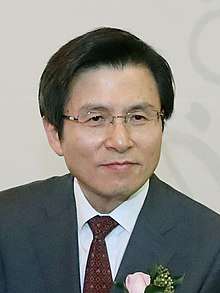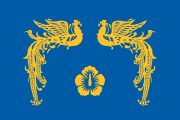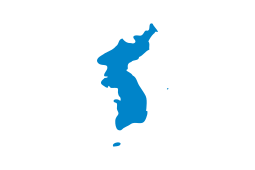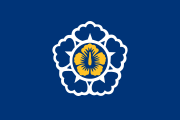Hwang Kyo-ahn
Hwang Kyo-ahn (Korean: 황교안; Hanja: 黃敎安; RR: Hwang Gyo-an; born 15 April 1957) is a South Korean politician and prosecutor who served as the 40th Prime Minister of South Korea from 18 June 2015 to 11 May 2017, having previously served as Justice Minister.
Hwang Kyo-ahn | |
|---|---|
황교안 | |
 | |
| President of South Korea Acting | |
| In office 9 December 2016 – 10 May 2017 | |
| Preceded by | Park Geun-hye |
| Succeeded by | Moon Jae-in |
| President of the United Future Party | |
| In office 17 February 2020 – 15 April 2020 | |
| Preceded by | Position established |
| Succeeded by | Shim Jae-chul (interim) |
| Chairman of the Liberty Korea Party | |
| In office 27 February 2019 – 17 February 2020 | |
| Preceded by | Kim Byong-joon (Interim) |
| Succeeded by | Position abolished |
| 40th Prime Minister of South Korea | |
| In office 18 June 2015 – 11 May 2017 | |
| President | Park Geun-hye Himself (Acting) Moon Jae-in |
| Preceded by | Choi Kyoung-hwan (Acting) |
| Succeeded by | Yoo Il-ho (Acting) |
| Minister of Justice | |
| In office 11 March 2013 – 18 June 2015 | |
| Prime Minister | Chung Hong-won Lee Wan-koo Choi Kyoung-hwan (Acting) |
| Preceded by | Gwon Jae-jin |
| Succeeded by | Kim Ju-hyeon (Acting) |
| Personal details | |
| Born | 15 April 1957 Seoul, South Korea |
| Political party | United Future (2020 - present) |
| Other political affiliations | Liberty Korea (2018 - 2020) |
| Spouse(s) | Choi Ji-young |
| Children | 2 |
| Alma mater | Sungkyunkwan University (LLB, LLM) |
| Korean name | |
| Hangul | |
| Hanja | |
| Revised Romanization | Hwang Gyo-an |
| McCune–Reischauer | Hwang Kyo-an |
| IPA | hwaŋ kjoan |
In 1981, he passed the judicial examination and in December of 1982, he started his career as prosecutor with the Chuncheon District Prosecutor's Office. He worked as a public security inspector with the Supreme Public Prosecutors' Office and the Seoul District Public Prosecutor's Office. He also wrote a book on the national security law called the "Public Security Investigation Textbook." [1]After serving as the Chief Inspector of the Busan High Prosecutors' Office in 2011, he served as an attorney at the Pacific Law Firm from September 19, 2011 to January 2013.
In 2013, he became the 63rd Minister of Justice. During his tenure as a minister of justice, he played a leading role in the investigation and conviction of Lee Seok-ki, and of the dissolution of the Unified Progressive Party.[2]
He was nominated as the 44th Prime Minister in May 2015 and assumed office on June 18, 2015.[3] On December 9, 2016, President Park Geun-hye's proclamation of impeachment passed, and he assumed the role of president until May 9, 2017.
In January, 2019, he joined the Liberty Korea Party, and was elected to the presidency on February 27th.
He served as Acting President of South Korea following the impeachment and removal of President Park Geun-hye by the Constitutional Court of Korea on 10 March 2017, until the election of Moon Jae-in on 9 May 2017. He had already taken over Park's presidential powers and duties on 9 December 2016 when impeachment proceedings were launched against her by the National Assembly and she was suspended from the powers and duties of the office.[4]
Early life and education
Hwang was born on April 15, 1957.[5] He graduated from Kyunggi High School in 1976.[5] He received his LL.B in 1981 from the College of Law at Sungkyunkwan University, and passed the 23rd National Bar Exam the same year.[5] He is a member of the Korea Baptist Convention.[6] Hwang managed to avoid the mandatory military service which all Korean male adults are required to complete by claiming a rare case of hives.[7]
Hwang earned his LL.M. in 2006 from the Graduate School of Law at Sungkyunkwan University.[5]
As prosecutor
Hwang was a career prosecutor.[5][8] He spent 30 years as a prosecutor, specializing in enforcing public safety and national security laws under the military junta of Chun Doo-hwan, gaining particular notoriety for targeting democracy activists by linking them with North Korea.[9]
Administrative career
Justice Minister (2013–2015)
Hwang joined the Cabinet of South Korean President Park Geun-hye in 2013 as minister of justice.[9] In that role, Hwang played a key role in the Constitutional Court case against the left-wing Unified Progressive Party (which was accused of holding pro-North Korean views); the case culminated in a controversial December 2014 order banning the party, a decision that some saw as a blow to freedom of speech in South Korea.[9][10]
Prime Minister (2015–2017)
On May 21, 2015, Park named Hwang as Prime Minister of South Korea, following the resignation of Lee Wan-koo due to allegations of bribery.[9][4][8]
In July 2016, Hwang was heckled and pelted with eggs and water bottles by crowds in the rural town of Seongju, who were opposed to deployment of the Terminal High Altitude Area Defense (a U.S. missile defense system) in the area.[11] The deployment plans angered local residents, who raised health and environmental concerns.[10][11]
Hwang "was regarded as the staunchest loyalist in Park's cabinet."[10] Nevertheless, on November 2, 2016, one month before her impeachment, Park fired Hwang as Prime Minister amid the 2016 South Korean political scandal as Park tried to rebuild confidence in her administration.[12][13] However, after "a dispute with opposition leaders over choosing a replacement," Hwang was kept in office as prime minister.[13]
Afterwards, Hwang attended the APEC meeting, which was held in Peru, on behalf of Park.
Acting President (2016–2017)
.jpg)
.jpg)
On December 9, 2016, upon the National Assembly's vote to impeach President Park following a political scandal, Hwang assumed Park's presidential powers and duties as Acting President.[14] On March 10, 2017, South Korea's Constitutional Court upheld the decision to impeach President Park Geun-hye and removed her from office. As a result, Hwang continued as Acting President of South Korea until new elections in early May, which were brought forward from December due to the constitution requiring new elections within 60 days of a permanent presidential vacancy.[15] On assuming the powers of the presidency, Hwang said he felt "deep responsibility".[14] The exact extent of Hwang's powers as acting president are unclear under South Korean law.[10]
His first field tour as acting president was to the Joint Chiefs of Staff in central Seoul, where he emphasized national security and stated "We are facing a grave security status, as we cannot entirely rule out the possibility of North Korean provocations near the Northern Limit Line (NLL)."[16]
Hwang decided against contesting the South Korean 2017 presidential election, declaring it would be inappropriate to run, opting instead to focus on his position as Acting President.[17][18] He was previously seen as the leading candidate for conservatives within the country, leaving them searching for a viable candidate other than Hwang to challenge leading contender Moon Jae-in for the presidency.[19]
He resigned as Prime Minister on May 11, 2017, after the election of his successor as president.[20]
Political career (2018–2020)
In November 2018, Hwang joined the Liberty Korea Party. He announced in January 2019 that he would be seeking the party's leadership position.[21] On February 27, 2019, he won Liberty Korea Party leadership election with 50.1 percent of the vote.[22] In 2020, Hwang is running for the Jongno district seat in Seoul, which includes the Blue House and Gwanghwamun Square.[23] Having led his party to a landslide defeat in the legislative election, Hwang resigned from the leadership on April 15th.[24]
Religion
He is a Protestant with a devout Baptist church, who also attended a night seminary and served as a church preacher. He is a member of the Christian Association of the legal profession.[25]
References
- "새 총리 후보자 황교안은…朴정부 초대 내각 멤버, 외유내강형 '공안통'". www.kukinews.com (in Korean). Retrieved 2019-07-06.
- "통합진보당 해산심판 청구안 의결…헌정 첫 사례(종합)". news.naver.com (in Korean). Retrieved 2019-07-06.
- "새 총리 후보자 황교안은…朴정부 초대 내각 멤버, 외유내강형 '공안통'". www.kukinews.com (in Korean). Retrieved 2019-07-06.
- "Park names Justice Minister Hwang Kyo-ahn as new PM". Yonhap. 21 May 2015. Retrieved 21 May 2015.
- Minister's Profile, MOJ, Ministry of Justice, Republic of Korea (accessed December 11, 2016).
- "황교안 후보자 17년 간 장학금 기부… 젊은 검사시절부터 이웃돕기 (Hope candidates donate scholarships for 17 years)" (in Korean). KMIB. 25 February 2013. Retrieved 1 November 2016.
- Borowiec, Steven (2017-03-16). "Hwang Kyo-ahn: The Man Who Wouldn't Be King". Koreaexpose. Retrieved 13 April 2020.
- "South Korea's Park names new PM after scandal strikes again". Reuters. 21 May 2015.
- Koichi Kato, Meet South Korea's new leader, Hwang Kyo-ahn: Conservative prosecutor has history of friction with opposition, The Nikkei (December 10, 2016).
- S. Korea's interim leader was Park defender; powers unclear, Associated Press (December 9, 2016).
- South Korean prime minister pelted with eggs by protesters, Agence France-Presse (July 15, 2016).
- Griffiths, James; Seo, Yoonjung (2 November 2016). "South Korea's prime minister sacked amid ongoing political crisis". CNN. Retrieved 2 November 2016.
- Jonathan Cheng, South Korea President Park Geun-hye Impeached: Decision on removal will come from Constitutional Court, Wall Street Journal (December 9, 2016).
- The latest: S. Korea PM officially becomes acting president, Associated Press (December 9, 2016).
- Hancocks, Paula; Hunt, Katie; McKirdy, Euan (2017-03-09). "South Korea: Constitutional court upholds President Park Geun-hye's impeachment". CNN. CNN. Retrieved 10 March 2017.
- Hwang visits JCS in first field tour as acting president, Yonhap News Agency (December 11, 2016).
- Sang-hun, Choe (15 March 2017). "South Korea to Elect New President in May, Government Says". Retrieved 16 May 2017 – via NYTimes.com.
- "PM not to run for presidency". 15 March 2017. Retrieved 16 May 2017.
- Sridharan, Vasudevan (15 March 2017). "South Korea's acting leader Hwang Kyo-ahn rules himself out of presidential race". Retrieved 16 May 2017.
- "694일만에 떠나는 황교안…10번째 장수총리". Retrieved 16 May 2017.
- "Ex-Prime Minister Hwang Kyo-ahn Announces Candidacy in LKP Leadership Election". world.kbs.co.kr. Retrieved 2019-01-30.
- "한국당 새 대표에 황교안…2위 오세훈·3위 김진태(상보)". News 1 (뉴스 1) (in Korean). 27 February 2019. Retrieved 27 February 2019.
- Blatt, Mitchell. "Key Races for Control of South Korea's National Assembly". The National Interest.
- "Main opposition chief steps down over parliamentary election defeat". Retrieved 16 April 2020.
- "한국아이닷컴!". www.hankooki.com. Retrieved 2020-04-12.
External links
| Political offices | ||
|---|---|---|
| Preceded by Choi Kyoung-hwan Acting |
Prime Minister of South Korea 2015–2017 |
Succeeded by Yoo Il-ho Acting |
| Preceded by Park Geun-hye |
President of South Korea Acting 2017 Acting for Park Geun-hye: 2016–2017 |
Succeeded by Moon Jae-in |




